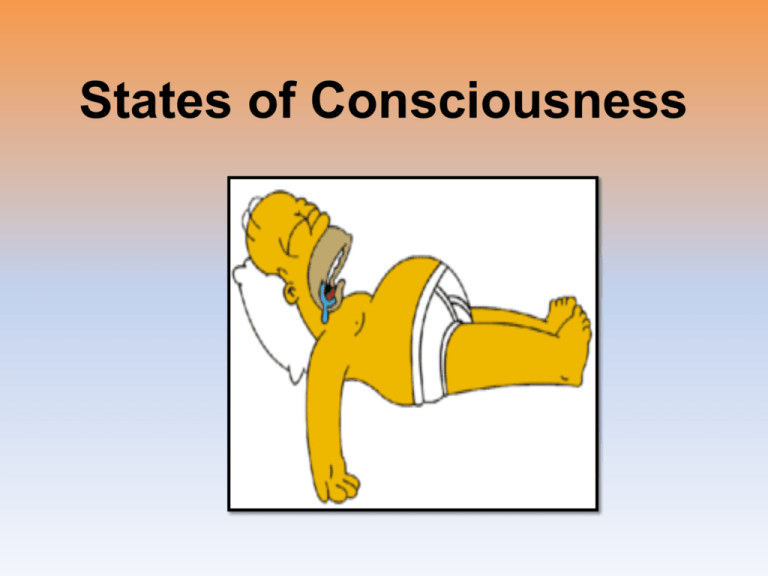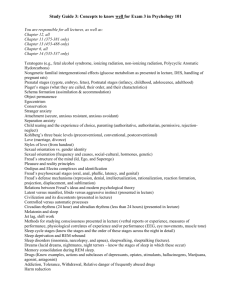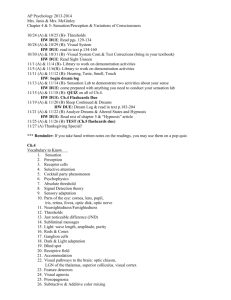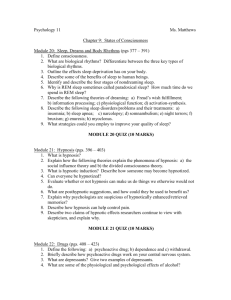States of Consciousness
advertisement

States of Consciousness What does it mean to be conscious? • Consciousness – Awareness of ourselves & our environment – States of consciousness • Awake • Daydreaming • Sleep • Dreaming • Hypnosis • Drug Induced • Meditation Who Dunnit? https://www.youtube.com/watch?v=ubNF9QNEQ LA 1:54 https://www.youtube.com/watch?v=vJG698 U2Mvo Simmons Selective Attention • Selective Attention –Ability to attend well to only one thing at a time • Change blindness – failing to notice changes in the environment Sleep and Dreams Biological Rhythms and Sleep Circadian Rhythm • Circadian rhythm –24 hour cycle –Temperature changes – melatonin https://www.youtub e.com/watch?v=Ub Q0RxQu2gM 4:00 Objective 2 What is the biological rhythm of our sleep? • Stages of sleep –Awake • Alpha waves –Awake but relaxed –Stage 1 • • • • • • Transition 1-7 minutes Light sleep Hypnagogic sensations Easy to awaken Aroused from stage 1 report they were awake Biological Rhythms and Sleep Sleep Stages Stage 2 – Onset of true sleep – Sleep spindles • High frequency bursts of brain activity – Muscles relax, heart rate , respiration ,temp • Stage 3 – Transition to deeper sleep – Continue to show more delta waves Stage 4 – Delta sleep – Deepest stage of sleep; most difficult to wake – Sleepwalking & talking present – Night terrors in children – If awaken, don’t remember REM • • • • • • • • 20% of sleep time Eyes move rapidly back & forth Fast frequency low amplitude Paradoxical sleep Heart rate & blood pressure increase Lose muscle tension & movement Dreams REM rebound – if deprived of REM; REM increase next night. Biological Rhythms and Sleep REM Sleep • REM sleep vs NREM sleep –Paradoxical sleep • Typical nights sleep –90 minute cycle https://www.youtube.com/watch?v=mNdRo eVthVM Baby in REM Biological Rhythms and Sleep Typical Nights Sleep Biological Rhythms and Sleep Typical Nights Sleep Biological Rhythms and Sleep Typical Nights Sleep Biological Rhythms and Sleep Typical Nights Sleep Biological Rhythms and Sleep Typical Nights Sleep Sleep Theories Objective 4: What is sleep’s function? • Sleep theories https://www.youtube.com/watch?v=pwNMvUXTgDY 8 min. –Sleep protects –Sleep helps recuperation –Memory storage –Sleep and creative thinking –Sleep and growth Objective 5: What are the major sleep disorders? • Sleep disorders –Insomnia –Narcolepsy http://www.youtube.com/watch?v=X0h2nleWTwI –Sleep apnea –Night terrors – http://www.youtube.com/watch?v=zdwYgGXQ5mo –Sleepwalking/ sleeptalking Objective 6: What Do We Dream? • Manifest Content – Storyline • Daily life works way into dreams • External stimuli works way into dreams Latent Content -symbolic meaning “Sometimes a cigar is just a cigar.” Objective 7: • To satisfy our own wishes – Freud; psychic safety valve; – Manifest Content / Latent Content • To file away memories – Information processing – Fix the day’s experiences in our minds • To develop/preserve neural pathways – Babies = Lots of REM • To make sense of neural static – Limbic system active during REM (i.e. amygdala) while frontal lobe less active A Lifetime of Sleep Attitudes Towards Hypnosis • A total score is obtained by 1st reversing the numbers given in response to statements 6,7,9,10,11,13, & 14 (1=7, 2=6, 3=5, 4=4, 5=3, 6=2, 7=1) • Now…add up all numbers in front of all 14 items • Scores range from 14-98 • Higher scores reflect a more positive attitude toward hypnosis Hypnosis Objective • Hypnosis – a social interaction in which one person (the hypnotist) suggests to another (the subject) that certain perceptions, feelings, thoughts, or behaviors will spontaneously occur. –Hypnotic induction –Hypnosis as an altered state? Facts and Falsehoods • Can Anyone Experience Hypnosis? – Yes…if willing – Postural sway • people who respond w/o hypnosis are the same people who respond with – Susceptibility • imaginative activities; focus on task • Can Hypnosis Enhance Recall of Forgotten Events? – no age regression / hypnotically refreshed memories Facts and Falsehoods • Can Hypnosis Force People to Act Against Their Will? – No…the person in authority can usually induce unlikely behavior whether hypnotized or not • Can Hypnosis Be Therapeutic? – Hypnotherapists • harness one’s own healing powers – Posthypnotic suggestion • Drug, alcohol & smoking addictions don’t respond well • Can Hypnosis Alleviate Pain? – Yes…hypnosis inhibits pain-related brain activity Explaining the Hypnotic State Hypnosis as a Social Phenomenon • Social influence theory – Trust hypnotist, let them direct their attention & fantasies – Normal consciousness NOT AN ALTERED STATE Divided Consciousness Theory • Carry out suggestion even when think no one watching • Distinct brain activity – areas of brain lit up when imagining color Dissociation • Mind split / levels of consciousness • Hypnosis dissociates the sensation of the pain stimulus from the emotional suffering = feels cold but not painful





